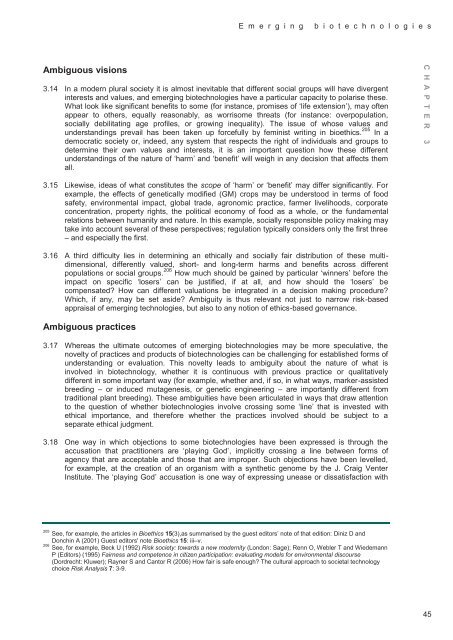Emerging biotechnologies: full report - Nuffield Council on Bioethics
Emerging biotechnologies: full report - Nuffield Council on Bioethics
Emerging biotechnologies: full report - Nuffield Council on Bioethics
You also want an ePaper? Increase the reach of your titles
YUMPU automatically turns print PDFs into web optimized ePapers that Google loves.
E m e r g i n g b i o t e c h n o l o g i e s<br />
Ambiguous visi<strong>on</strong>s<br />
3.14 In a modern plural society it is almost inevitable that different social groups will have divergent<br />
interests and values, and emerging <str<strong>on</strong>g>biotechnologies</str<strong>on</strong>g> have a particular capacity to polarise these.<br />
What look like significant benefits to some (for instance, promises of ‘life extensi<strong>on</strong>’), may often<br />
appear to others, equally reas<strong>on</strong>ably, as worrisome threats (for instance: overpopulati<strong>on</strong>,<br />
socially debilitating age profiles, or growing inequality). The issue of whose values and<br />
understandings prevail has been taken up force<str<strong>on</strong>g>full</str<strong>on</strong>g>y by feminist writing in bioethics. 205 In a<br />
democratic society or, indeed, any system that respects the right of individuals and groups to<br />
determine their own values and interests, it is an important questi<strong>on</strong> how these different<br />
understandings of the nature of ‘harm’ and ‘benefit’ will weigh in any decisi<strong>on</strong> that affects them<br />
all.<br />
C H A P T E R 3<br />
3.15 Likewise, ideas of what c<strong>on</strong>stitutes the scope of ‘harm’ or ‘benefit’ may differ significantly. For<br />
example, the effects of genetically modified (GM) crops may be understood in terms of food<br />
safety, envir<strong>on</strong>mental impact, global trade, agr<strong>on</strong>omic practice, farmer livelihoods, corporate<br />
c<strong>on</strong>centrati<strong>on</strong>, property rights, the political ec<strong>on</strong>omy of food as a whole, or the fundamental<br />
relati<strong>on</strong>s between humanity and nature. In this example, socially resp<strong>on</strong>sible policy making may<br />
take into account several of these perspectives; regulati<strong>on</strong> typically c<strong>on</strong>siders <strong>on</strong>ly the first three<br />
– and especially the first.<br />
3.16 A third difficulty lies in determining an ethically and socially fair distributi<strong>on</strong> of these multidimensi<strong>on</strong>al,<br />
differently valued, short- and l<strong>on</strong>g-term harms and benefits across different<br />
populati<strong>on</strong>s or social groups. 206 How much should be gained by particular ‘winners’ before the<br />
impact <strong>on</strong> specific ‘losers’ can be justified, if at all, and how should the ‘losers’ be<br />
compensated? How can different valuati<strong>on</strong>s be integrated in a decisi<strong>on</strong> making procedure?<br />
Which, if any, may be set aside? Ambiguity is thus relevant not just to narrow risk-based<br />
appraisal of emerging technologies, but also to any noti<strong>on</strong> of ethics-based governance.<br />
Ambiguous practices<br />
3.17 Whereas the ultimate outcomes of emerging <str<strong>on</strong>g>biotechnologies</str<strong>on</strong>g> may be more speculative, the<br />
novelty of practices and products of <str<strong>on</strong>g>biotechnologies</str<strong>on</strong>g> can be challenging for established forms of<br />
understanding or evaluati<strong>on</strong>. This novelty leads to ambiguity about the nature of what is<br />
involved in biotechnology, whether it is c<strong>on</strong>tinuous with previous practice or qualitatively<br />
different in some important way (for example, whether and, if so, in what ways, marker-assisted<br />
breeding – or induced mutagenesis, or genetic engineering – are importantly different from<br />
traditi<strong>on</strong>al plant breeding). These ambiguities have been articulated in ways that draw attenti<strong>on</strong><br />
to the questi<strong>on</strong> of whether <str<strong>on</strong>g>biotechnologies</str<strong>on</strong>g> involve crossing some ‘line’ that is invested with<br />
ethical importance, and therefore whether the practices involved should be subject to a<br />
separate ethical judgment.<br />
3.18 One way in which objecti<strong>on</strong>s to some <str<strong>on</strong>g>biotechnologies</str<strong>on</strong>g> have been expressed is through the<br />
accusati<strong>on</strong> that practiti<strong>on</strong>ers are ‘playing God’, implicitly crossing a line between forms of<br />
agency that are acceptable and those that are improper. Such objecti<strong>on</strong>s have been levelled,<br />
for example, at the creati<strong>on</strong> of an organism with a synthetic genome by the J. Craig Venter<br />
Institute. The ‘playing God’ accusati<strong>on</strong> is <strong>on</strong>e way of expressing unease or dissatisfacti<strong>on</strong> with<br />
205 See, for example, the articles in <strong>Bioethics</strong> 15(3),as summarised by the guest editors’ note of that editi<strong>on</strong>: Diniz D and<br />
D<strong>on</strong>chin A (2001) Guest editors' note <strong>Bioethics</strong> 15: iii–v.<br />
206 See, for example, Beck U (1992) Risk society: towards a new modernity (L<strong>on</strong>d<strong>on</strong>: Sage); Renn O, Webler T and Wiedemann<br />
P (Editors) (1995) Fairness and competence in citizen participati<strong>on</strong>: evaluating models for envir<strong>on</strong>mental discourse<br />
(Dordrecht: Kluwer); Rayner S and Cantor R (2006) How fair is safe enough? The cultural approach to societal technology<br />
choice Risk Analysis 7: 3-9.<br />
45
















